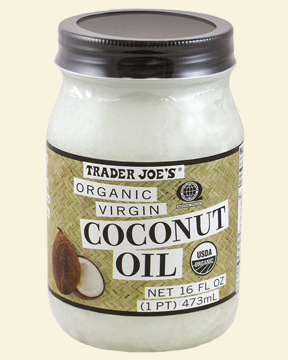Why Cook With Coconut Oil Instead Of Olive Oil?
I am as guilty of this as the next person. For much of the time I have been cooking my own food, I used olive oil…for EVERYTHING. Sautéing kale and broiling sweet potatoes in the oven to make “fries” were a few of the ways I used olive oil.  As I have expanded my nutrition knowledge (of course this happened AFTER college, when I started actually having more time to cook), I learned that anytime you cook a food, you run the risk of creating heat-induced damage. The oils you choose to cook with must be stable enough to resist chemical changes when heated to high temperatures, or you run the risk of damaging your health. One of the ways vegetable oils can inflict damage is by converting your good cholesterol into bad cholesterol—by oxidizing it.
As I have expanded my nutrition knowledge (of course this happened AFTER college, when I started actually having more time to cook), I learned that anytime you cook a food, you run the risk of creating heat-induced damage. The oils you choose to cook with must be stable enough to resist chemical changes when heated to high temperatures, or you run the risk of damaging your health. One of the ways vegetable oils can inflict damage is by converting your good cholesterol into bad cholesterol—by oxidizing it.
When you cook with polyunsaturated vegetable oils (such as canola, corn, and soy oils), oxidized (combined with oxygen) cholesterol is introduced into your system. As the oil is heated and mixed with oxygen, it goes bad, or rancid. Rancid oil is oxidized oil and should NOT be consumed, as it leads directly to vascular disease. Trans-fats are introduced when these oils are hydrogenated, which increases your risk of chronic diseases like breast cancer and heart disease. But the problems don’t end there.
The majority of these vegetable oils (at least in the U.S.) are made from genetically engineered crops, and they’re heavily processed on top of everything else. So not only are the polyunsaturated fats being oxidized, but these oils also contain other toxins, such as glyphosate and Bt toxin found in genetically engineered corn and soy.
Of all the available oils, coconut oil is the oil of choice for cooking because it is nearly a completely saturated fat, which means it is much less susceptible to heat damage. And coconut oil is one of the most unique and beneficial fats for your body.

Although mainstream media portrays olive oil as the “healthiest oil,” this title does not extend to cooking. Olive oil is primarily a monounsaturated fat, which means it has one double bond in its fatty acid structure..
Olive oil is a smart fat to include in your diet in a non-heated form, such as in a salad dressing. If you are cooking with virgin olive oil to over 200 to 250F, you are running the risk of creating an oxidized oil that can do your body more harm than good.
As I said before, coconut oil contains the most saturated fat of all edible oils—but don’t let the term “saturated fats” scare you away. Saturated fats are not the cause of heart disease, in spite of what you may have heard. Whenever you need a cooking oil, a good quality coconut oil can be used in place of any other oil type, for any kind of recipes.
Just realize, coconut oil can vary widely in terms of the variety of coconuts used and the type of processing, and these factors will greatly impact the health benefits of the oil. Most commercial coconut oils are refined, bleached and deodorized and contain chemicals used in processing. Make sure that your coconut oil is certified organic, which means it contains no genetically engineered ingredients, and that it’s free of bleaching, deodorizing, refining or hydrogenation.

And by the way, if you don’t like the taste of coconut oil, some other good ones for cooking are grape seed, which has a lighter taste, or if you want a little Asian flair, sesame is another favorite.






